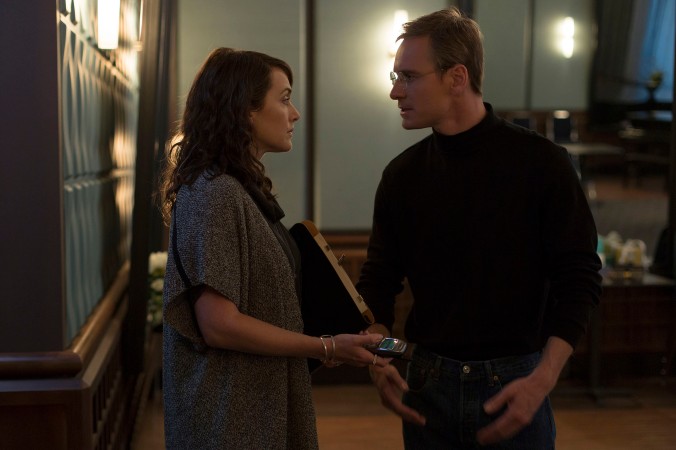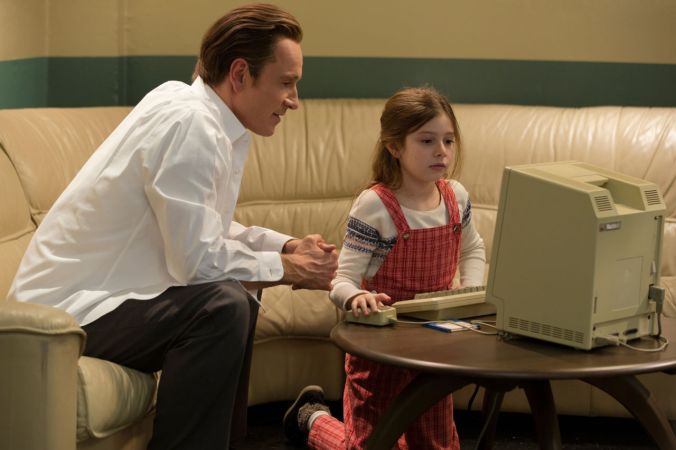
United States | 13 November 2015 | Directed by Danny Boyle | Starring: Michael Fassbender, Kate Winslet, Seth Rogen, Jeff Daniels, Michael Stuhlbarg, Katherine Waterston
So it’s now that time of year, with the Awards season looming, that all the Oscar bait starts to appear, including the traditional biographical portrait of an inspirational figure. Last year, there was The Theory of Everything, Selma, Unbroken, The Imitation Game and American Sniper, all of which were victorious or were nominated at all the top awards ceremonies. In the past few decades, we’ve seen films like Lincoln, The King’s Speech, The Blind Side, The Queen, The Aviator, JFK and Ghandi receive the highest acclaim, yet ultimately these films are celebrated the year they are released and are quickly forgotten.
When it comes to the awards themselves these films are essentially praised on a political basis for their earnest subject matter, rather than being judged on how visually stimulating, emotionally engaging and downright entertaining they are. The biopics of last year touched on sentimental subjects, which would inevitably pull on the heartstrings of the film industry voters, yet I was relieved to see the masterpiece of magical realism, Birdman, win the big prize.

This year, Steve Jobs is the biopic big-hitter, which will likely be nominated along with the other biographical contenders Trumbo, The Danish Girl, Joy and Black Mass. As one may guess from the blatant title, Director Danny Boyle’s latest film recounts the successes and failures of the co-creator of Apple, who pioneered a technological revolution a series of computers and devices that now dictate our everyday lives.
Aaron Sorkin would probably scream if he knew I had placed his film in the same boat as some of the biopics previously mentioned, because the script, structure and general aesthetic of the film seem to be purposely unconventional and adventurous. Steve Jobs is far from your average cradle-to-grave story, as instead of summing up the Apple founder’s career, we only witness three key moments in his and the company’s history, resulting in a film that consists of only three scenes or ‘acts’ if you will.

The entire film was indeed written, rehearsed and performed like a stage play with the focus being on the constant succession of conveniently queued conversations between Jobs and the usual suspects of the Apple dynasty. Each act is set during the stressful minutes before the launch of the newest product: the Macintosh in 1984, the NeXT in 1988, and the iMac in 1998, where previously repressed truths and anxieties are brought to the fore causing many clashes of brainy heads.
On each occasion, Steve falls in to conflict with his puppet engineer Andy Hertzfeld (Michael Stuhlbarg) who’s doing the best job he can; Apple CEO John Sculley (Jeff Daniels) who is fighting Jobs for overall power; co-founder Steve Wozniak (Seth Rogen) seeking recognition for the original Apple team; his neglected daughter Lisa and her mother Chrisaan (Katherine Waterston) seeking financial aid and a caring father, and his ‘work wife’ Joanna Hoffman (Kate Winslet) who is desperately attempting to control the chaos and keep the insolent Jobs in check.

To recreate the tone and feeling of the separate eras, Danny Boyle impressively constructed the film in three different formats: 16mm, 35mm and digital, each with their own specific lighting, production design and the way they were shot, visually enhances the progression of Jobs and the company from its manic and rebellious beginning to its sleek and controlled conclusion.
Each act is effectively a duplicate of itself, as whilst the characters’ relationships and the levels of power have slightly altered every time, the audience essentially enters the same tedious merry-go-round of one-on-one battles, with characters taking very predictable turns to have another yell at Jobs. Thankfully, owing to the delightfully comic and gripping verbal gymnastics that Sorkin provided in the script and the impassioned acting that does them justice, we can get through without dozing off.

What is perhaps even more unconventional than the film’s structure, is the negative light in which Jobs is displayed. Just like Jesse Eisenberg’s unbearably cocky Mark Zuckerberg in Sorkin’s previous tech-nerd biopic The Social Network, Steve Jobs is utterly unlikeable from start to finish. From the way he bullies Hertzfeld and rejects Wozniak, to how he completely denies paternity of Lisa and reluctantly gives assistance to the poverty-striken Chrisaan after her desperate pleads for Steve to recognise and support his daughter. From the first act, there is not one good attribute to draw from this obnoxious, arrogant, condescending and inherently cold character. In each squabble, you find yourself always rooting for Jobs’ opponent, as the way he treats people would suggest he has some kind of social or mental issues.

Beneath the vulgar behaviour, it really is hard to find any of the genius that we are supposedly watching this film in order to witness. You start to realise the truth that the real brains behind the computers were people like Wozniak and Hertzfeld. The only thing Jobs was a nerd for was marketing and design. He knew how to make thinks look nice and simple to use, which crucially is all the average consumer is really interested in. He was able to rein in the tech wizs when they got to carried away with making super computers that the average person would never understand. At one point, Wozniak does question Jobs’ significance, to which Jobs answers: “Musicians play their instruments. I play the orchestra.” Essentially, Jobs’ genius was in the way he could make anyone do what he wanted just by the eloquence of his tongue. He may have not been the leader that everyone liked, but without him Apple would have gone nowhere.

The defining moments of Steve Jobs are the relentless arguments, choreographed here like action sequences constantly building on top of each other, leading to the big crescendo that is the product launch – which Sorkin and Boyle divisively don’t show a second of. There is a real sense that we are witnessing a more truthful ‘behind-the-scenes’ depiction of what the real Jobs was like – something closer to a maniacal, oppressive dictator rather than the inspiring, lovable Godlike genius we are used to seeing on stage and screen. Sorkin has undoubtedly embellished some of Jobs’ characteristics, not to mention the turn of events, but he, along with Michael Fassbender’s outstanding embodiment, has constructed a central figure that is refreshing and unpredictable – so frustrating to watch, but at the same time undeniably enjoyable.
The problem with the character is that he is wholly unsympathetic. We are supposed to pity Jobs when we flashback to when Sculley and the board unanimously give him the sack, as the rain chucks down outside. Yet we’ve been given no reason up to this point, to be on his side. Similarly in the 1998 act, where Jobs has exhibited the same amount of repulsive behaviour as he did back in 1984, suddenly he has a sentimental moment with a certain character where he shows a shred of humanity and compassion, a tenth of what any real person would give in that situation, and it’s as if all his previous actions have been completely vindicated. Boyle then stages an overly epic and glorifying ending sequence where Jobs goes on stage with the grand clamour of The Maccabees’ ‘Grew Up At Midnight’ in the background. The audience, along with this other character, are meant to look on in awe at our so called ‘hero’ in what is a complete abomination of an ending.

There has been some outrage from various people involved with Apple who have argued Steve Jobs takes too much dramatic license and completely abandons the truth in favour of fictionalised and exaggerated events, which it totally does and Sorkin has owned up to, explaining that entertainment is always prioritised over accuracy. The monster Sorkin has created is indeed entertaining, but at the same time, I can’t help but think if you have to fictionalise and exaggerate the material as much as Sorkin has to make it interesting, what is left? Is there anything tangible or truly enlightening about Jobs that the audience can take away from this?
It may be cynical to suggest that Steve Jobs is simply Oscar bait. It was undeniably a satisfying cinema experience with a few great Sorkin-penned quotes to take home and some memorable performances from Fassbender and surprisingly Seth Rogen, who is superb at playing the serious guy for once. Yet the more I think about the reason this film was made, the more I feel like Steve Jobs’s name was just picked out of a hat – just like the self-wringing mop inventor’s name probably was for David O’ Russell’s next movie Joy. Who could Sorkin be writing about next… Bill Gates? Larry Page? Hewlett and Packard?

Jobs was an influential megalomaniac whose success is worthy of praise and character worthy of study and I appreciate the fact that the film (like the man himself) was risky, confident and innovative, but despite trying to desperately avoid being a tiresome, predictably glorifying biopic, it seems that this was exactly what the film was always destined to be. What it comes down to is that fact that I just didn’t care. I cared about Solomon Northup’s escape to freedom in 12 Years A Slave, I cared about Aron Ralston’s escape from between a rock and a hard place in 127 Hours, I cared about the success of Jackie Robinson in 42 and I may have even cared about Benjamin Mee’s impulse to buy a zoo in We Bought A Zoo, more than I care about Steve Jobs. There are thousands of more interesting and engaging stories out there, true and fictional, in finished forms and purely notional, eagerly waiting to be shown on the big screen and geniuses like Boyle, Sorkin and Fassbender could be telling them.